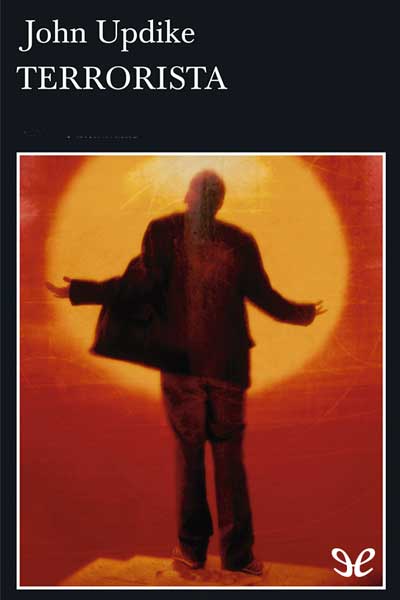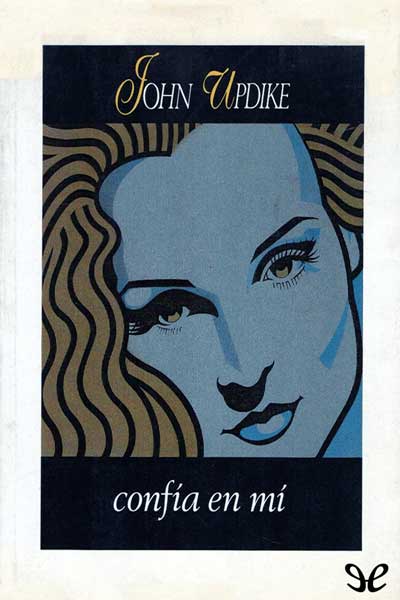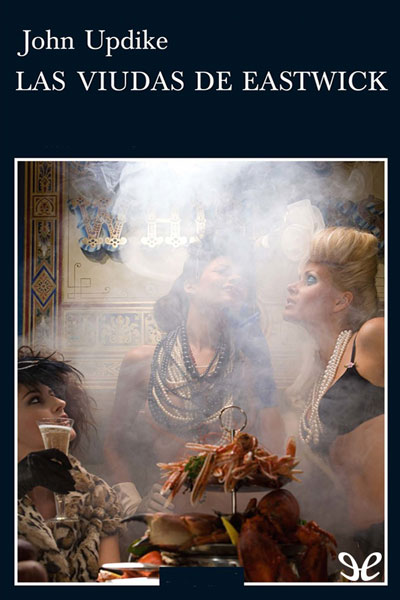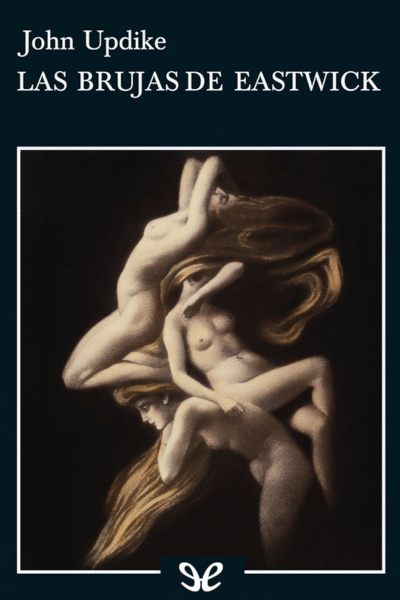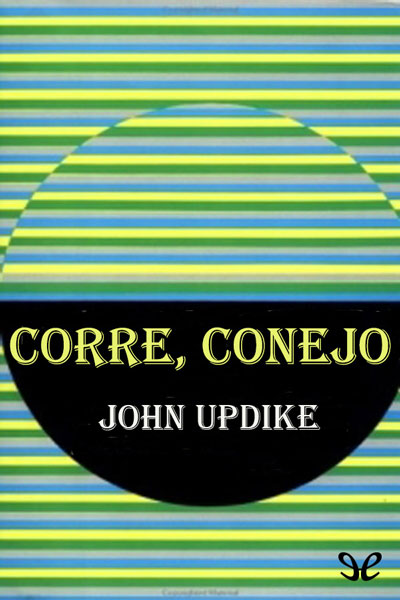oleebook.com
Le lacrime di mio padre de John Updike
de John Updike - Género: Italian
Sinopsis
Hanno nomi e professioni diversi gli uomini che popolano questi racconti di John Updike, ma condividono una storia comune: l'infanzia da figli unici in una cittadina di campagna della Pennsylvania, al centro degli affetti e delle tensioni di una famiglia travolta dalla Grande depressione, la fuga verso un'università della costa orientale, il matrimonio, i figli, la vita nei quartieri borghesi, tra feste e tradimenti, il divorzio, un nuovo matrimonio, una vecchiaia fatta di viaggi all'estero e goffi tentativi di mantenere i rapporti con figli di mezza età molto indaffarati e nipoti che oppongono loro una cortese indifferenza. Tormentati dal crescente isolamento, persi nei luoghi stessi in cui sono nati e cresciuti, ossessionati dal pensiero della morte imminente ma ancora percorsi dal desiderio e divisi tra voglia di libertà e doveri familiari, i protagonisti di questo libro bramano un ultimo contatto con la vita, come Fairchild in "L'espansione accelerata dell'universo", stranamente rivitalizzato da uno scippo subito durante un viaggio in Spagna, o inseguono occasioni perdute, come Les in "Mogli delicate", ossessionato da un amore ormai finito. Dal loro punto di vista distante e straniato, accumulando i racconti come strati di una meticolosa indagine archeologica, Updike disegna un'ultima mappa di quella fetta di mondo che ha saputo descrivere e raccontare come nessun altro, affidando alle proprie parole il compito di preservare ciò che ormai è cancellato.
Libros Recomendados - Relacionados
Reseñas Varias sobre este libro
well, updike croaked this year and this is his last collection of stories. its wonderful. sad and elegaic and gentle. one of his best.
in Personal Archaeology a guy wanders around the large yard surrounding his country house and takes stock of the places history by what he sees -- shards of teacups encrusted into hard soil conjures images of a young girl, thirty years earlier, hastily burying a broken teacup before mom gets back home; mason jars in the shed bring to life their original owners who lived in the house nearly a century ago. through this simple device updike is able to tease out the horrible subjectivity of human existence and experience.
this born alone, die alone thing -- the seeking out people to share experience but always with the nagging feeling that as much as you try, as deep as you go, you can never truly convey the ineffable uniqueness of what it feels to be you. or ever truly know another human.
its almost unbearable to feel existence so powerfully, to feel the wonderful and mad crush of confusion and happiness and melancholy, to feel alive in a world of music and flesh and ideas... and wonder if anyone truly understands it the way you do. so we write. and we read. and we learn that other people do feel this shit. and theyve been feeling it way back before homer was writing and theyll be feeling it up until the world goes pop. and while we never can know if what i'm seeing when i say 'green' is the same as what you're seeing, or what i'm feeling when i say 'love' is the same as what you're feeling... the investigation isn't wholly arid, it does lighten the burden of existence.
so updike. there are not many writers better at conveying the sense of what it means and feels to be here. to be alive. to be alive right now. to exist on earth with a brain, a heart, eyes, a cock/cunt, a soul... and there aren't many writers better at putting across the sense that, despite all of this, most human interaction is marked by botched attempt and missed opportunity.
56 s Luís2,057 821
I expected better, given the author's very caustic and cynical reputation.
The last collection of short stories written before his death (but published posthumously) cannot help but think that some short stories are unfinished or proofread. wise, we note (bitterly?) that a consecrated author can afford largesse with the short story genre. But ultimately, it is more the publisher than the author responsible for such a mixture.
The whole is, therefore, unequal. There are pearls, on 9/11, for example, but there are free bowls. Updike is fatally obsessed with death, old age, and degradation. A lot of bitterness, tenderness, and nostalgia. But not always a lot of content. The style is significantly borrowing, bordering on being mannered, but sometimes hits the mark, as the search for the perfect word is taken (sometimes) to the extreme.2021-readings e-342 s Kuszma2,404 197
"Olyan könny? tévedni, mikor a halottak szavait idézzük."
Ez a kötet összefoglalható egy mondatban: visszarévedünk abba a korba, amikor még úgy t?nt, mindenre van id?, és rájövünk, milyen rosszul osztottuk be. Egy-két elbeszélést?l eltekintve az összes írás arról szól, hogy kitárjuk azt a párás kisablakot, ami a múltra nyílik, megnézzük, amit látni enged, aztán megnézzük azt is, hová jutottunk. A jelent, amit ugyan telepakoltunk a tisztességgel megélt élet trófeáival (divatos kanapéval, egyetemi serlegekkel, ex-feleségeink képeivel a falon), de ezzel sem tudjuk eltakarni a lakás leromlott állapotát, a felhólyagzott vakolatot, az am?baalakban terjeng? penészt.
Ami azt illeti, nem ett?l a könyvt?l támadt kedvem megöregedni.19 s Kathleen263 31
I have rarely read short stories that made me so reflective. I would read one, savor it for days, and then move on. 12 s Red Fields317
I read this for a book group. It's not a book I would've chosen on my own. I thought it got off to a good start with the first story but subsequent stories seemed to be too much of the same settings and themes over and over. Only-boy children, raised during/after the Depression, by parents and grandparents, infidelity in the 1960s, sometimes divorce, distance from their children. It was kind of boring although the guy is great at descriptive writing. You can picture everything but after a while you just don't care to.7 s JimmyAuthor 6 books243
Here is a blog post that tells the story of one encounter I had with the author John Updike:
https://www.goodreads.com/author_blog...stories updike6 s Barbaraw - su anobii aussi241 31
Invecchiando, migliora...
L'Updike dei primo romanzi, divertiti e sarcastici è maturato in questa ultima raccolta e propone due o tre racconti molto belli. Epurati. Come se, invecchiando, Updike si fosse accorto che non aveva dato l'essenziale. Qui, in alcune pagine, va al cuore della sua vita. Pochi elementi, alcune figure (sempre le stesse: il padre, la madre, un matrimonio che muore, un bambino che lo percepisce) si stagliano, limpide, in racconti liberati dagli ornamenti superflui. 5 s Leftbanker875 398
Jesus, what a huge bore this was to read. I wont say that Updike is out of touch, just that whomever he is trying to touch isnt anyone I recognize. I think he spent too many years in the sterile environment of the New Yorker to have anything to say to anyone outside of his microscopic world.
Im a bit ashamed to admit this, but I wanted to hate this collection of John Updike stories. They are just about exactly what I expected from having read some of his novels. For the most part, these are totally pointless exercises in writing with little or no concern for actually telling a story with structure, things a beginning, middle, and end. I dont even him as a person. Hes weak and full of himself and the writers life which means extra-marital affairs or whatever.
Ive said this before and Ill say this again: for as respected a writer as Updike has been over the course of my adult life, Ive never met anyone who would say that he is their favorite author or that one of his books are among their favorites. Id make the same claim of Bellow, Joyce Carol Oates, John Cheever, and Phillip Roth. I think they are all huge bores with nothing much to say.
Im guessing that Updikes target audience is literature professors, douche bags who make a career out of focusing on some ridiculous and pointless aspect of an authors work or life, discovering some heretofore secret buried in the boundless wisdom of the writer. Id rather write for factory workers or convicts.
Morocco A complete coward and his family drive around Morocco back when it was completely safe to do that sort of thing. He lets some old dude jerk off watching his family at the beach.
The Guardians Lee by now was pursuing an M.F.A. degree in Iowa City. Ive said of all the above-mentioned literary titans that once you start talking about writing youre finished as a writer, at least in my book. They say that you should write about what you know, so go out and learn about something new instead pf sitting in your university office contemplating the next faculty cocktail party, or which grad student you want to fuck next. There is nothing that I would call a story in this story.
Varieties of Religious Experience Of course, Updike just has to throw his hat into the ring of 9/11 rememberers. And get this, it from different points of view! Ugh, not very interesting at all. I thought he would have at least gone further into the terrorists thinking.
The Accelerating Expansion of the Universe A completely ridiculous and pointless telling of a violent mugging in Spain of a dim-witted American tourist.
But the fact, discovered by two independent teams of researchers, seemed to be that deep space showed not only no relenting in the speed of the farthest galaxies but instead a detectable acceleration, so that an eventual dispersion of everything into absolute cold and darkness could be confidently predicted. We are riding an aimless explosion to nowhere. Only an invisible, malevolent anti-gravity, a so-called Dark Force, explained it. Why should Fairchild take it personally? The universe would by a generous margin outlive himthat had always been true.
I suppose this is the authors attempt at gravity and seriousness because Spain, his earlier story about Morocco, is a land of great peril.5 s Brian Fagan314 114
In fairness I should say that I prefer novels to short stories. But after having read all of John Updike's novels, a mark I was NOT glad to achieve, I looked at this collection as a kind of tasty dessert after so many delicious entrees. The 18 stories in My Father's Tears were published as an anthology in 2009. One was written way back in 1979, but the others all came after 2000.
In Morocco, the narrator is condensing down, from the perspective of a considerable passage of time, the present significance to him of a family trip taken long ago. I believe that many of us have noticed that what seems important at the time of family gatherings is not always what we look back and remember, fondly or otherwise.
Personal Archaeology is a surprisingly disjointed account of a man's recollection of "treasures" he found over the years on his coastal Massachusetts property. I suspect this story was particularly autobiographical, as John Updike did live in Massachusetts and in Pennsylvania, as the story also recounts. When he mentioned finding old liquor bottles, it reminded me of a story from my own childhood that I to tell. My friends and I d to explore the woods south of our suburban Baltimore subdivision. We often came on empty liquor bottles. I imagined that hobos passed through the area and left them. It wasn't until quite recently when I started drinking whiskey that the smell took me back to those woods, and I started laughing. Those weren't hobos - the bottles were almost certainly left by teenagers sneaking up into the woods to sit around and drink.
Probably my favorite story is The Walk With Elizanne. A man meets a former classmate at their 50th high school reunion. She reminds him of a kiss they shared, and how it had always held special significance for her. I remember how stunned I was at my 25th reunion when I learned that the only girl I had a bad crush on had one for me and still did.
As I read The Road Home, I was reminded that John Updike always wrote with a keen eye on setting - he was fascinated by small towns and their histories and their changing physiognomies. I enjoy this in a writer, and some of my other favorites include it in their writing, too, including Richard Russo and especially Joyce Carol Oates.
While nearly all writers share the skill of observation, for some reason I enjoy Updike's observations about people more. I'm not sure exactly why, but I think it has to do with the feel of truth and not always, but usually, a sense that he withholds quality judgments and just observes. But don't read him if you need large doses of humor.
4 s Bill79 10
Proustian Reflections on American Life
Updike, John (2009). My Fathers Tears and Other Stories. New York: Random/Ballantine.
Eighteen previously published stories of fifteen to twenty pages make up this posthumous collection. Each one is a gem not a bad one among them, and that is all the more remarkable because they are superficially about the most mundane aspects of everyday life in America in the twentieth century. Characters go to the store or a dinner party, a class reunion, or have a family vacation in Spain, or join a tour group in India. High drama ensues when one character holds a glance a moment too long, or the electricity goes out at home during a storm, or a character visits his dermatologist. All the action, all the drama, is on the inside. In most cases, the main character reminisces about life and love, time and death, and longs for meanings that never appeared.
The main characters are nearly all adult males, most older, retired, or elderly. They remember fumbling through marriages, affairs,and divorces. They are generally alone now, isolated, divorced; feeling dissatisfied and perplexed; facing irrelevance, meaninglessness, and death. A couple of main characters are young boys who describe confusing, impoverished childhoods in the Depression as they try to find meaning in experience, and describe the often pathetic old people that populate their lives. In most stories, the settings are suffocating New England towns where emotions are locked up by traditional roles and relationships. In a big city setting, we see nothing of wild, creative chaos, but only the staid, emotionally constricted lives of the characters.
So in a sense, these stories are depressing, since they are all about escaped happiness, longing, loss of meaning, unrealized love, and so forth. But isnt that how life turns out ultimately, for any thoughtful person? There is a sense of sharp self-recognition in the reader. The characters are so alive, and the writing so lyrical, that one becomes deeply immersed. Marveling at the writing, I sometimes got stuck re-reading a single paragraph for a half hour. For example:
The worst seemed to be over when, in mid-afternoon, his computer died under his eyes. The financial figures he had been painstakingly assembling swooned as a group, sucked into the dead blank screen glittering water pulled down a drain. Around him, the house seemed to sigh, as all its lights and little engines, its computerized timers and indicators, simultaneously shut down. The sound of wind and rain lashing the trees outside infiltrated the silence.
The omniscient narrator is strong, even intrusive, so much so that it is difficult to read more than two or three of the stories at a stretch without that narrator becoming tedious. wise, the sets become claustrophobic, the tone aridly cognitive-intellectual, and all the characters and locations start to blend into just a few archetypes. The stories are therefore best read in short bursts separated by a day of rest.
Nearly all the stories are third person, past tense, omniscient; a form that facilitates a strong narrative voice. One, written from the point of view of a young boy, is third person, present tense, which struck me as awkward and contrived, but maybe thats just because it is less common. A story about the attacks of 9-11 switches among several points of view, from a grandfather watching the towers fall to one of the hijackers on Flight 93 into Pennsylvania. All the stories are masterpieces. literary4 s ShaneAuthor 11 books286
This is by far the weakest of the Updike books I have read. The themes are familiar: memories of youth, aging lust, infidelity, late second marriages, guilt over the collapse of the first long marriage that begat children, death and insignificance. Updike seemed to be eternally atoning for the breakup of his first marriage as he neared the end of his days, as evinced in this posthumously published collection.
Except for the 9/11 piece Varieties of Religious Experience, which is narrated from the points of view of the victim, the perpetrator, and the bystander left with the legacy, none of the stories are powerful enough to engage. A footnote on the 9/11 piece: Updike did a more thorough examination of this theme in his novel Terrorist, which I enjoyed. The stories set in Spain and India, and outside the familiar US-East Coast milieu, fail to excite as they are focused on the internal quest of the narrator and are not integrated with the exotic locales. The opening story set in Morocco and written back in 1969, makes such an effort at integration, but ends up reading more a travelogue.
The normally fluid writing of Updike seems to have developed a different rhythm, and I had to re-read some of the longer sentences to fall back into the flow.
It appeared to me on concluding this book, that this collection of stories had been assembled to reflect the last days of the great author, what he was pre-occupied with at the time, what he regretted not having accomplished, and what he had witnessed during his career. Its a pity that the normally punchy prose had given way to a languid musing, with a reluctance to excite the senses lest that be too much for the fragile health of the aging author. It was as if the tired Rabbit Angstrom had finally returned home to his hutch, to rest, after bopping vigorously around the neighborhood for a very long time.
4 s N140 23
és az enyémek. Apámat, ha kétszer láttam sírni, könnytelenül. Csak szipogott, és az orrát dörgölte. Egyszer akkor, amikor a bátyám disszidálni indult, úgy a 80-as években, de a Mez?berény táblánál visszafordult. Honvágya lett. Emlékszem, üvöltöttem vele, hogy ne merje ezt még egyszer az apámmal megtenni. Iszonyúan fájt. Apám bánata belém mart. Nem üvöltöttem azóta sem, hangosan sosem. Aztán akkor, mikor 19 évesen elköltöztem otthonról. Ült az ágyon, nézett rám, és azt mondta, ami itt marad, az úgy marad. Azóta is ott van minden cuccom, amit nem vittem magammal. Ugyanott van. Tudom, egyszer össze kell majd pakolni, rendesebben. Anyám a kulcsaimat kérte. Letettem a konyhaasztalra. Apámnak hatalmas keze van. Kaptam t?le egy pofont 79 körül. Mert hazudtam. Soha többet nem tettem. Neki jobban fájt ez az ütés, mint nekem. Apám szeme zöld, mint az enyém, látom benne az életemet. Olyankor kezem a kezére teszem, lassan megsimítva, halványan, de mosolyogva azt mondom, jól vagyok papa, ne öregedj miattam. Az élet úgyis elneveti magát ezt Mészölynél olvastam, de végig ez dobog bennem. Nem fogom tudni el (át) engedni. A bölcsességét szeretném majd örökölni.4 s Harold Griffin40 21
Lamenting the prospect of no more Updike, I was excited when I inadvertently discovered this collection of short stories. I thoroughly enjoyed, but cannot say that I loved the volume, which was filled with characteristic insights into the human condition, but without any real knockout tales, just literate, intelligent vintage-Updike musings. The last story, "The Full Glass," ends -- in light of Updike's demise -- with a "toast to the visible world," the toaster's "impending disappearance from it be damned", bringing a little mist, but only a little, to my over-sentimental eyes.
Still, a schoolboy delivering a book-report, I must say to all Updike fans that "everyone should read this book," if only to reach the end of reminiscences of Updike's life in "Alton" and the after-years that followed.4 s Stephen Murley229 1 follower
One of the last collection of stories from one of America's finest storyteller. Beautiful sentences you want to read over and over. "Personal Archaeolgy" was my favorite story. This is a must read for any Updike fan. I really miss him!4 s Giuseppe Del Core175 6 Read
Un giorno dovranno spiegarmi perché a Updike non hanno dato il Nobel, l'Oscar, il Pallone d'oro, perché non c'è una piazza a suo nome in ogni città del mondo. Immenso.3 s Edward1,002 65
Updike, John, MY FATHERS TEARS, and other stories (2009), read 12-2011
A wonderful and moving collection of short stories which appeared the same year that John Updike died at age 77. They are told from the point of view of old men who both look back on their lives while simultaneously living in the present and in the last story, The Full Glass, appropriately enough, look forward to their demise. Victorian writers, someone said, wrote only about sex and death, and that could as well describe Updikes concerns. Never far from the consciousness of his characters are memories and relationships with the opposite sex, and with death. Wives, ex-wives, and old love affairs are at the heart of the former. Deaths are those of parents, friends, and more generally, experiences of his youth, which are now dead except in his memory. As Les comments in Delicate Lives, thinking back about an old girlfriend, For what was majestically more intimate even than sex but death? He imagined her motionless profile, gray with collapsed blood pressure, cradled in his arms.
But theres nothing morbid about any of these stories. More than anything, they celebrate experience, experience that only reveals its beauty and value in retrospect. In the title story, for example, the narrator says he only saw his father cry once in his life. It occurred when he left for college and said goodbye to his father at the train station/ He reflects,, as an old man, My father did foresee, the glitter in his eyes told me, that times consumes us that the boy I had been was dying if not already dead, and we would have less and less to do with each other. My life had come out of his his, and now, I was stealing away with it. They had always been close and the inevitable distancing between parent and child that comes with maturing was making itself felt. The story ends with the fathers fatal heart attack, and only then does the circle close and he and his father are close again.
There is hommage to Marcel Proust in these stories. In The Apparition Milford felt himself towering as if literally mounted on Prousts figurative stilts of time. Memory allows us to rise above events, to see their significance, to see through he lens of time having passed. In several stories, grandfathers now view their adult children as parents themselves and wonder how their long ago actions influenced these children, two generations removed from themselves. They live in different worlds and communication about these things is tentative and uncertain. In "The Accelerating Expansion of the Universe" a grandfather questions his hold on the past, things that had belonged to his mother survivors of a life of which he was the last caring witness, remnants that he lacked the will to discard. There is a sweetness in the memories that these things evoke, but a danger, too.. At the end of the story some old doors that he had been saving, topple over on him. Symbolically, then, an obsession with the past can be deadly. Its this openness to the meaning of experience that makes these stories so good, and make a reader appreciate short fiction at its best. Each story is a satisfyingly captured experience.
The last story ends on this note, a kind of epitaph for old age and its glory which a reader can't help but feel is a valedictory for Updike himself. My life-prolonging pills cupped in my left hand, I lift the glass, its water sweetened by its brief wait on the marble sink top. If I can read this strange old guys mind aright, hes drinking a toast to the visible world, his impending disappearance from it be damned.
3 s Christopher RothAuthor 3 books35 Read
Most of these I must have read in The New Yorker originally, but the only one I recalled is "The Guardians," which still stands out as pretty much the bestabsolutely mind-blowing. "The Apparition," which takes place among American tourists in India, is also superb, and the last line is a punch in the stomach. Both, most of these stories, deal with the connection between sex and death in the male brain/mind/Weltanschauung, which is also as I take it the underlying theme of all Updike's work. My only complaint about this volumeaside from the fact that it is his last book, which is not Updike's fault, of courseconcerns "Varieties of Religious Experience," his story about 9/11, which bounces back and forth among the spiritual points of view of various people on that day, including one of the terrorists, fortifying himself with drinks in a strip club; a grandfather witnessing it from his daughter's apartment building rooftop (which was where Updike himself watched it); a WTC office worker trapped in one of the floors above the impact point of the first tower; and an elderly woman aboard the plane that crashed in Pennsylvania. In my opinion, when he wrote this the events themselves were too raw, and he didn't get the tone right at all. I suppose one day I'll read his 2006 novel Terrorist, but not anytime soon I don't think. Still highly recommended. Eventually Updike will get the recognition he deserves, as 20th-century American fiction's finest prose stylist, and one whose writings, even in their mundanest moments, always slam straight into the heart of the most important metaphysical questions.3 s Catherine38 1 follower
I have not read Updike before but this collection seems a rather transparent recollection of his own (short) stories. Here is a reminiscence of travel, of how ambivalent families and places can make one feels, of loves come and go, of id and ego in battles, of how memories can be grand and insignificant all the same. Here and there, as it is unavoidable of a recollection, you sniff a what if. And how comforting for the soul that the mind can offer such an alternative.3 s Oto Bakradze536 36
??????????? ????????? ???????? ????????????? ???????????. ?????? ??? ???? ???????? 5 ??????????? ????????. ??? ?????? 3 :D20-ce ???????2 s Alan280
I love Updike, so it was sad reading his last book of short stories. These seem so personal that they must be at least half autobiographical. Many take places in Pennsylvania, where he was born, and featured characters in the last part of their lives. Updike stories always show off his great vocabulary, concise and vivid descriptions, and lusty characters. He was interested in sex and illicit relationships all of his life and these stories are no exception. I think his main point was that people reveal deep emotional secrets and a picture of authentic selves when they step out of normal life and enter an affair. No doubt that Updike, most guys, thought about sex all the time but what made him different was his masterful ability to write about it. In his early books Updike seemed to treat sex as an erotic amusement park but in these last stories sex seems to be more plain, natural, and an important part of being human. In this collection is my favorite of all of Updike's stories, which is A Walk with Elizanne, the best high school reunion story ever written.2 s Heather Alderman958 35
I picked this up to complete a book challenge, but was also really looking forward to reading these short stories by Updike. I enjoyed the first story, but then each of the subsequent stories felt a similar version of the first. All the stories had a semi-autobiographical feel to them but with different names and very slightly different characters. library-book short-stories2 s John Pappas409 29 Read
Stories from the POV of old men looking back on transformative moments in their lives, or looking at their limited futures. Amazingly written, and sad.2 s Books I'm Not Reading214 114
The one star goes to ONE particular story that was good. The rest ... ugh.short-story-collections2 s Susan Emmet1,161 1 follower
No time to review story by story, but this anthology captures older, already published and never published stories by Updike. It was published in the year he died. Several stories "read" as though they were unedited; others shine.
My favorite is "Varieties of Religious Experience," one of the longest and most inventive, centering on three viewpoints with a controlling omniscient narrator. "There is no God," says Dan Kellogg as he sees the World Trade Center towers fall. The second are two of the Isis keystones. The third is Carolyn, an elderly seasoned traveler who is killed as her plane crashes in PA. She pleads for mercy. Six months later, the story returns to Dan who muses on ongoing horrors in the world and his daughters' and granddaughters' reactions.
Many of the stories focus on infidelity, love found late, travel, looking back on life and how "things" turned out, aging, being unable to see before it's too late and a host of other themes.
A fine anthology by one of my favorite authors. I miss Updike!1 Cathryn Conroy1,149 45
Published in 2009 just a few months after John Updike's death at age 76, this collection of 18 short stories is a magnificent look at the world past and present. The keen observationsfrom the quotidian details of life during the Great Depression to doomed love affairsare what make these stories of faith, infidelity, and the small choices we make in everyday life so resonant and powerful.
Some of my favorites:
"The Walk with Elizanne": The high school class of 1950 is holding its 50th reunion in 2000, and David Kern encounters his first girlfriendbut doesn't immediately recognize her. Then all the thoughts! All the memories!
"Varieties of Religious Experience": This is the story of 9/11 told through the viewpoints of a New York City survivor, someone trapped high in the World Trade Center, two of the hijackers, and passengers on one of the doomed flights, but they are all wrapped up in one man's loss of faith because God let it happen.
"Delicate Wives": The story of a couple who had an illicit affair, break it off, and then reunite years later.
"Kinderszenen": Life during the Great Depression as told through the viewpoint of a little boy, an only child living with his parents and grandparents in an old house that may have a ghost or two.
Beautifully written with distinct characters, but sometimes overlapping settings, this masterful collection is one to be savored. It is storytelling at its finest.
1 Stef SmuldersAuthor 33 books118
The first few stories are among the best I have ever read due to the incredibly good style of the author. In the later stories the lack of a plot or development takes some of the quality away, as well as the fact that all stories have the same theme: an old man looking back on his life. Excellent writing though.short-stories1 Mark Wenz271 2
I recently read the first two Rabbit novels and had mixed feelings about them, but nevertheless I felt compelled to pick up this book when browsing the shelves at my local library. Im happy that I did. The problems I had with Updike in the first two Rabbit novels--his sexism, immaturity, lack of a moral vision, and creation of a flashy style without much substance underneath it--are no longer issues in this, his final collection of short stories. The characters in these stories are more grown up, more admirable, more reflective, and more morally focused than those in the Rabbit series, which is Updikes most well known (and frequently most well regarded) collection of books. The characters in My Fathers Tears are people who have lived long lives (almost all of them are in their 70s or 80s) and who are now reflecting on the legacies theyre leaving behind them. Updike has always focused primarily on male protagonists, which is also true in this volume, but his female characters here seem realistic, fully human, admirable (despite obvious foibles) and strong--contrasting sharply with the weak, confused, needy women in the Rabbit books--several of whom are current or former prostitutes. In short, Updike has matured, and so have his characters. Updike masterfully ends the stories in poetic fashion: the last paragraph of each tends to skillfully summarize the proceedings and leave the reader with a lasting impression without preaching or resorting to cliches. Its nice to see a writer of Updikes talents finally grow up. Grade: A
1 Regina Mclaughlin19 2
As intimate and confessional an assortment of narrators as Updike ever conjured up. Some not able, others not trustworthy. AS can be expected, these tales are redolent of familiar sound, taste, see, smell and touch. Updike seizes hold of our nerve endings and tantalizes the brain to interpret this neurologic input: what to make of seeing a garment worn askew, what the feel of a barefoot gambol on grass tells of the past, how a whiff of fragrance can become freighted with long-forgotten associations.
Because Updike is so dense,I find that attacking an entire anthology continuously can be somewhat suffocating. Reading thes stories in sequence feels being on a weeklong diet of pinot grigio and brie. After finishing one short story, I d to take a break... go out and consider life on my own sensory, social and moral terms, before permitting the author to once again do a tapdance on my neurons, and submitting to the existential state he projects.
My favorites of these stories were: "The German Lesson", "Kinderszenen", "Outage" and especially the final one,"The Full Glass," which sweetly touched on the pleasures of reflective life.
1 Cecilia688 36
This book was not written for me. (I am of the wrong generation, even my parents are of the wrong generation, and I am not a middle class male from rural Pennsylvania.) However, the writing is hypnotic. As I read the stories, I felt as if I were in a gentle whirlpool, on language. The stories have so many overlaps that it feels continuations from one to the other. It is is if you gently snag one story into the other and draw a new plot line.
At the beginning I did not this book. I could not relate, but it is on the Pulitzer List so I gave it a shot. But the end, I felt I was creating some of the stories.... dreaming them really, so 3 stars for the cosmic trip. If I were a middle age man who was born in the 30s and grew up in rural Pennsylvania I probably would have given it 5.
read-20101 Tom Ferguson123
Autor del comentario:
=================================

